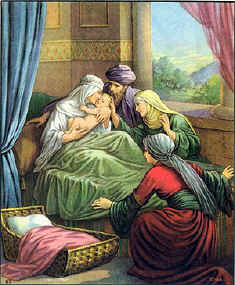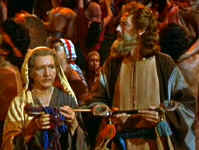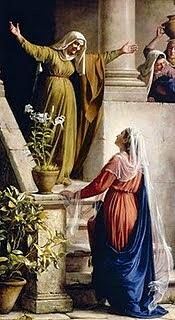

Close this window to return to previous page.
- or -
Click HERE to go to the list of lessons for this course.
LESSON SIX
WOMAN TWENTY

Elisheba, the wife of Aaron
The wife who grieved alone.
| I. | Elisheba |
|
||
| A. | Elisheba (also Elisabeth and Elizabeth): various meanings are given for her name: "my God has sworn" or "God is an oath" or "the oath, or fullness, of God" or "God's oath" or " God is her oath". Although all of these are somewhat varied, they all echo much similarity. It is not an uncommon belief that her name has
significance. Some believe it is in the following way. Lockyer stated "... this may be a allusion to the great promise to Abraham confirmed by the oath of God." He further states that "Wilkerson remarks that 'Perhaps the name was an appeal to that oath in the extremity of national depression and distress; for she must have been born towards the close of the bondage in Egypt, and about the time during which the cruel edict of Pharaoh for the destruction of male children was in operation.' " This could very well be. God had promised Abraham that He would bless them that bless Abraham and his posterity and curse them that curse Abraham and his posterity. (Gen 12:3; 17:7) The naming of Elisheba may very well have been in remembrance of the promise; and, on God's part He may have led her parents to choose that name because He knew, long before she was born, that it would be during her lifetime that He would deliver the People in partial fulfillment of His promise to Abraham and his posterity. |
|||
| B. | She was the ancestress of Elisabeth who was a cousin to Mary, the mother of Jesus Christ. Therefore, Elisheba was in the lineage of Jesus through her father, Amminidab. | |||
| II. | She was the daughter of Amminadab. (Ex 6:23) | |||
| A. | Her father, Amminadab, was of the tribe of Judah. |
|
||
| B. | By marrying Aaron, she joined the two lines of Judah and Levi; which were the royal (Judah) and the priestly (Levi) lines. | |||
| III. | She was faithful in her duties as Aaron's wife and a mother to his children. (6:23) | |||
| A. | She bore Nadab, the firstborn, and Abihu, Eleazar, and Ithamar to Aaron.. (Num 3:2) | |||
| B. | She also bore several daughters to Aaron. (Lev 10:14; Num 18:11, 19) | |||
| IV. | She was the ancestress of the entire priestly line. | |||
| Through her came the entire priesthood that served throughout the history of the nation from its inception all the way to the time of Christ when the priesthood of the family of Aaron was replaced by the priesthood of the believer. Ex 28:43 "... it shall be a statute for ever unto him and his seed after him." | ||||
| V. | Her husband Aaron and her sons became the first priests of Israel. | |||
| She experienced both blessings and cursings because of the priesthood in the line of her family. | ||||
| A. | Her
husband and her sons became the first priests of Israel. (Ex 28:1
& 43) The priesthood was to remain within the family of Aaron. As Aaron's wife, Elisheba became the sole vessel through whom would come every priest, including every High Priest, of Israel from the inception of the priesthood until the end of it during the time of Christ. The very first High Priest, her husband Aaron, being excepted of course. |
|
||
| B. | Her son Eleazar. | |||
| 1. | Her son Eleazar, her third-born, was not only a priest but also was appointed as the chief over the chief of the Levites, which was the tribe that was given over to the service of the Lord's house. (Num 3:32) | |||
| 2. | He became the High Priest. (Num 20:25-28) Unfortunately it was because of the death of his two older brothers and his father, Aaron. For her son, Eleazar, to become High Priest was a blessing for Elisheba; but, it was mixed with a cursing. Her son Eleazar only became High Priest because his two older brothers, the oldest of whom should have become High Priest, were slain. This left Eleazar as the eldest of the two remaining sons. When he became High Priest it must have been a jarring reminder of the deaths of his two brothers. In addition, Eleazar only became High Priest because his father, Aaron, also died. (Deut 10:6) This loss of her husband must have also added to the sorrow of the situation. Therefore, the blessing for Elisheba seeing her son become High Priest must have been completely overshadowed by the circumstances surrounding his ascendance to that office. When it happened she had to deal not only with the jarring remembrance of the deaths of the two older sons but she also had to deal with the current death of her husband. NOTE: This is all predicated on her still being alive when Eleazar became High Priest. The Bible actually does not tell us one way or the other. However, that would only change the speculations concerning the blessing of seeing her son become High Priest and the cursing of loosing her husband. It would not change the cursing of seeing her two oldest sons slain for their sin because she was alive when that happened. |
|||
| C. | Her two oldest sons, Nadab and Abihu. | |||
| 1. | They were priests in Israel and Nadab was in line to be High Priest after his father Aaron. (Ex 28:1) | |||
| 2. | They offered strange fire before the Lord and were slain for it. (Lev 10:1-2; Num 3:4) | |||
| 3. | Although the nation of Israel bewailed the loss of the two older boys, of those in her immediate family she had to bear her sorrow for the death of Nadab and Abihu alone. Her husband and her other two sons were forbidden by God to prepare the two dead men for burial or to go through the grieving and burial process at the time of the deaths because they were in the middle of their priestly service to the Lord. (Lev 10:1-7; 21:10-12) | |||
| VI. | The death of Elisheba is not recorded in the scriptures. | |||
 (NT - Elisabeth greets Mary) |
||||
| VII. | Notable progeny of Elisheba and their close relatives. | |||
| A. | Every true Priest and High Priest of Israel. (progeny) | |||
| B. | The prophets Ezekiel and Jeremiah. (progeny) | |||
| C. | Zadok, the High Priest at the time of David the King who helped David regain his throne from David's own son, Absalom. (II. Sam 15:24-37) (progeny) | |||
| D. | Elisabeth, the mother of John the Baptist and cousin to Mary the mother of Jesus. (progeny) Elisabeth means "oath of God." Therefore, it is the NT equivalent of OT "Elisheba." This means that Elisabeth was most likely named after her notable ancestor, Elisheba. |
|||
| E. | Mary, cousin to Elisabeth and the mother of Jesus. (close relative) | |||
| F. | Jesus. (close relative) | |||
| G. | John the Baptist. (progeny) | |||
Summary:
| 1. From the life of Elisheba we learn, foremost, that even if the husband is prominent and bears much burden in ministry to God, the wife bears much burden along with him; only hers is concerning her main ministry, the family, rather than the ministry of her husband. 2. We also learn that no matter how prominent the family and how involved in the Lord's work they may be, bad things can still happen in good families. 3. Thirdly we learn that sometimes the wife must bear her burden alone. At least for a while. We aren't told in the Bible whether Aaron and the two younger boys grieved with Elisheba after completing their duties or not; but, we do know for certain that at least for some time she had to bear her burden of extreme grief without them. 4. We learn that God's rules are to be kept by everyone; and especially families in the Lord's service. And that they are held to a higher standard (I Tim ch. 3; Titus ch.1) with what can be extreme consequences. 5. Of all of the members of the family, the mother oftentimes is the one who suffers the most. (cf. Gen 3:16) |
 |
| NOTE: It is amazing how many variations are found in various languages for the name Elisheba. (Elisheva or Elisheba (אֱלִישֶׁבַע in Hebrew) (The following list is not exhaustive.) |
|
|
|
LESSON SIX TEST
WOMAN TWENTY
This test is "open
book," which means you may
use your study materials while taking this test.
If you fail this test then you must wait a minimum of one day before you can
retake it. During that time you are required to go to the textbook and the
Bible, whichever is appropriate, and find the correct answers to every
question missed on the failed test. You may use the copy of the
failed test that was sent to you and refer to it for the correct
answers, which are included on it, to verify that you have
found the correct answers in your study materials.
Once you have found all of the correct answers
and waited the required one day, then you
may retake the failed test.
You cannot proceed to the next Lesson until the day after you have
passed this Lesson Test and found all of the correct answers
in the textbook or the Bible, whichever is appropriate, to
all questions missed on this test even though
you received a passing score.
Close this window to return to previous page.
- or -
Click HERE to go to the list of lessons for this course.